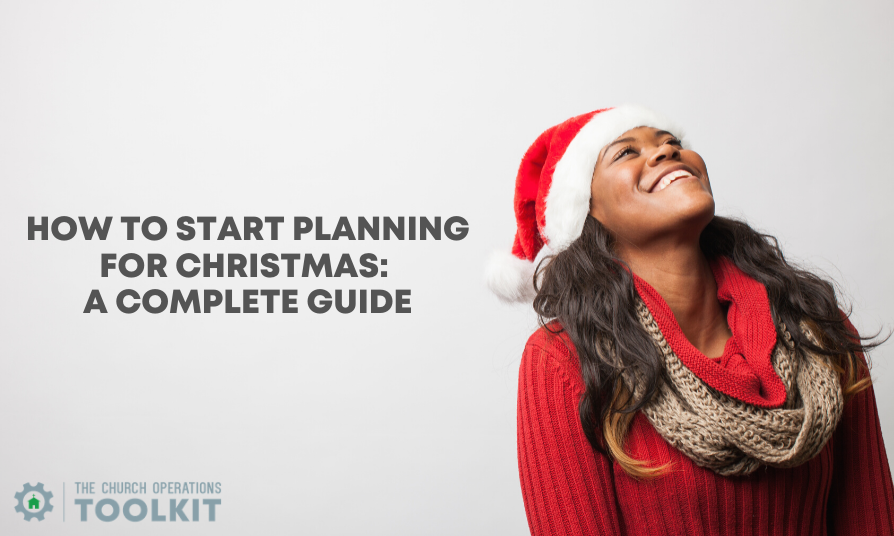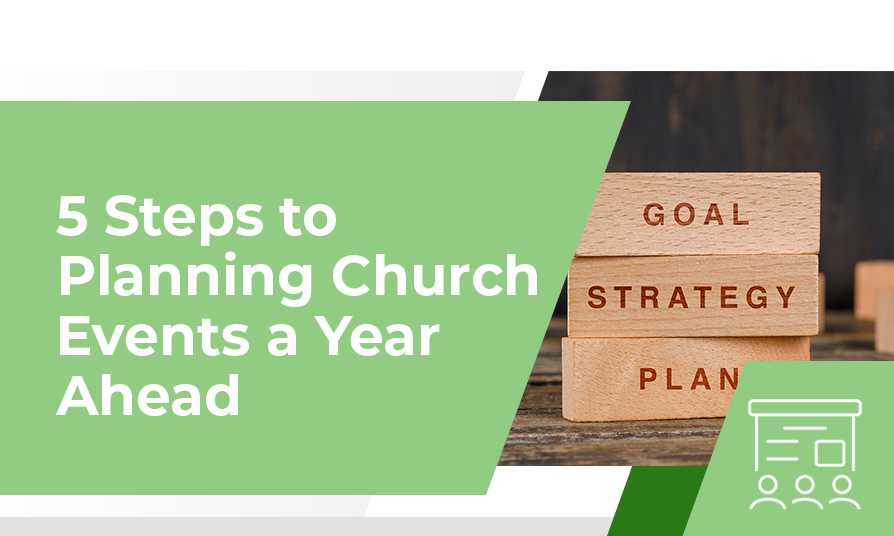The Christmas season is many things: joyous, hopeful, magical, peaceful, and full of charitable giving. It’s also an extremely busy time for churches. As holiday events typically ramp up in the weeks before Dec. 25th, it’s a good idea to get a clear vision of your Christmas event schedule well in advance. And with most church event planning, the earlier the better is a good motto to adopt. To get you prepared for your busy season, we’ve gathered all things Christmas into one complete guide to help you plan a memorable, Christ-filled celebration at your church — whether it’s one event or many. Here’s our take on how to start planning for Christmas.
Step 1: Plan Staff Availability
We all know that Christmas is a time when people who typically don’t come to church will make the effort to attend a service. This provides a great opportunity to minister to people you don’t normally get to reach. However, in order to plan and execute Christmas services well, you need the help of your church staff members. The challenge with this time of year is that many people, including church staff, want to visit their families for the holiday. To find the balance with your staff, consider these tips:
Start the vacation planning process ASAP
Set a deadline for your staff to submit vacation requests for the holidays. Require that they include a plan to ensure their responsibilities are covered in their absence. This could include a list of key volunteer leaders who could step in for them at a service or another staff member who will be in town and is capable of taking over.
Plan ahead without filling up the calendar
December is full of Christmas parties, holiday outreaches, and family celebrations. For the sake of your staff and volunteers, don’t bog them down with too many events. Schedule holiday outreaches and Christmas celebrations well in advance so people can plan accordingly.
You don’t have to host a Christmas Eve service
You can celebrate Christmas the Sunday before and leave the week open for families to celebrate together. There’s no right answer on this one, figure out what works best for your church. However, don’t just do what you’ve always done without giving thought to what’s best for your congregation, volunteers, and church staff.
Step 2: Begin Planning for Christmas Events
Because coordinating extra Christmas activities requires extra planning, now is a great time to start preparing. Here are three tips to get you started:
Coordinate with local nonprofits
Do you have a few nonprofit agencies that you work with on a regular basis? If so, reach out to them to see how you could help them this year. Compile a list of these potential outreaches, decide what you’re going to do this year, then put those events on your church calendar to reserve the dates.
Appoint volunteer team leaders
Ask a few volunteers to see if they’d be willing to organize an outreach as its event planner. Introduce them to your contact at each nonprofit and have your volunteer be the main contact for that outreach. This volunteer leader should work with you to recruit and coordinate volunteers, organize donations, and lead the church event. Be available as a backup and gather updates from them, but let your volunteers take the lead as event coordinator as much as possible. As these volunteers prove themselves, they can make planning for Christmas (and other big events) much easier for everyone.
Plan details of your Christmas services
Decide if you’ll have a Christmas Eve service and/or a service on Christmas Day. Take into consideration when you and your staff will be able to take time off to spend the holidays with family (see Step 1). You’ll want to also to gather volunteers, which we’ll discuss in Step 3 below.
Step 3: Create a Volunteer Checklist
Whether you decide to put on a huge Christmas pageant or a traditional candlelight service, you’ll need volunteers to make each service special for your congregation. This checklist will help you stay organized as you delegate to volunteers.
Determine how many volunteers, in what roles, you’ll need for each Christmas service.
Recruit Early
Ask your volunteers to start signing up now for specific service(s). Bonus tip: VolunteerSpot is a free and easy-to-use online tool for signing up volunteers.
Attention to Detail
Document the order of your service, along with any special instructions you have for the volunteers.
Prepare and Review
Email the service order and instructions to your volunteers 1-2 weeks before the Christmas services. Review the information at volunteer pre-service meetings the Sunday before Christmas.
Friendly Reminders
Send a confirmation email to volunteers the day before they are scheduled to serve as a reminder of details and arrival time.
Always Have Backup
For Christmas plays or more complicated services, train a handful of volunteer leaders. Make sure they know everything you know about the service so they can answer questions and provide direction when you’re not available.
Express your gratitude
Make sure you have thank you cards on-hand to send to volunteers within a week (or two) after Christmas.
Step 4: Manage Preparation Stress Like a Pro!
Stage design, volunteers, service planning, special programs, and more are all part of the hustle and bustle of the season. So, how do you manage all this activity and still feel some semblance of peace on earth and goodwill towards men? Here are a few tips to help:
Tip #1: Pause…and Write
If you’re running around trying to fix last-minute issues, fill those last few volunteer spots, and figure out why in the world your carefully designed stage décor keeps falling over, it’s easy to get into crazy mode. When that happens, you can’t think straight and will likely forget something important or miss the easiest, most obvious solution to a problem: Pause.
Take a few deep breaths, pray for wisdom, and think. Write down all the stuff floating around in your head – whether it’s directly related to planning Christmas services or trying to figure out who’ll watch your 3-year-old tomorrow. Get it all down on paper and then review the list. Decide if there’s anything you can delegate and make that happen ASAP. Prioritize the rest of the list and start working your way down, crossing off items as you resolve them.
Tip #2: Consider the Big Picture
As everything takes shape for your service or church event, do a walk-through. Start in the church parking lot and pretend you’re a first-time guest:
- What’s the most obvious entrance to the church building from the parking lot?
- As I walk in this door, is it easy to tell where to check in our children?
- Where do we go for the service?
Then, walk into the main sanctuary and stop right inside the door:
- What impression do you get?
- What emotions do you feel?
- Consider what the décor and stage setup communicates to guests
The point here is to stop for a few moments and look at the setup comprehensively. You may realize that the stage piece that just won’t cooperate really doesn’t matter anyway and isn’t worth the hassle. If a few details have to be left undone, it’ll be okay. Once again, focus on what really matters and don’t let the small stuff get to you (easier said than done, I know).
Tip #3: Take notes
Undoubtedly, there will be things you’ll want to change for next year (if only to make life less crazy the weeks leading up to Christmas). Keep a notebook with you and jot down quick notes regarding things to improve on or change for next year. It’s easy to forget these afterward, which is frustrating when the same issues pop up all over again.
Tip #4: Attend a service with your family
This may require coordination with the rest of the staff, but it’s important for your family to have you all to themselves for one service. Sit with them and enjoy the moment with your family. If this isn’t possible, consider creating your own family tradition at home or even go to a service at another church (maybe one in your community has a Saturday night service and your church doesn’t).
Step 5: Reflect As You Go
As you go through the process of planning for Christmas, it’s easy to get distracted by all the things you think you should be doing. These three questions will help you reassert your goals and keep you focused on the true meaning of the season.
What are we trying to accomplish?
It’s easy to get excited about a big Christmas production with cast members, set décor, elaborate lighting, and lots of festive music. Though wonderful elements of an impactful service, let’s not get so caught up in the details that we forget the big picture (as mentioned above).
We’re trying to reach people with the Gospel who may only go to church at Christmas and Easter while helping believers celebrate our Savior’s birth. If going old school and less complicated better achieves that goal for your church, by all means, keep it simple.
How much do we want to do?
Special Christmas outreaches, productions, and services require extra effort (read: long working evenings and weekends) for your staff and volunteers. This is already a busy time of year with families traveling or hosting loved ones, a variety of holiday celebrations, and much more.
Before you start desperately begging people to serve at multiple events, consider how many events will help you achieve your goals and allow your congregation to truly celebrate what this season represents. I’m not saying eliminate everything, but perhaps five services on Christmas Eve and Christmas Day plus ten outreaches during December and a partridge in a pear tree are a bit too much.
How will you finish out this year?
As we clean up the Christmas dinner dishes, we’re also thinking about the coming new year. Have a staff meeting to reflect on what your team has accomplished this year.
- How many people came to Christ?
- Who has grown into new leadership roles (either staff or volunteer)?
- Has your church gone through a few storms this year and come out stronger?
Celebrate those victories. Ask yourselves why you were successful and how you can learn from those wins. Give your team some time off to enjoy their families, reflect on this past year, seek God’s direction for the coming season, and recharge their batteries.
Planning for Christmas can be a huge endeavor. It can also be a smooth, successful, and stress-free one. If you’ll take the time now to plan ahead, you can serve your community and provide incredible times of ministry — all without wearing out your team.
When in doubt, remember: The whole point of hosting Christmas services is to tell the story of Jesus’ birth and why He came to earth. We’re trying to lead people to our Savior, the greatest gift we could ever give.



